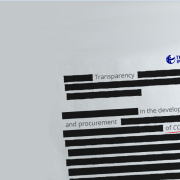|
Getting your Trinity Audio player ready...
|
Corruption Watch, in fulfilling its commitment to ensuring accountability and the integrity of public finances, sent a letter to National Treasury (NT) on Thursday, 7 May 2020, expressing its concern regarding the repeal and release of different instruction notes relating to emergency procurement under COVID-19.
The release of successive instruction notes has created legal uncertainty and increased risk of corruption due to the lack of transparency or provision for monitoring procurement by third parties. The organisation, which has been closely monitoring NT’s emergency procurement regulations, requests further clarity on the process for procurements which occurred under previous regulations, whether these are to subsist, and what reporting and publication requirements are in place.
“Issues of transparency and accountability are paramount in all of our work, and nowhere are these more critical than in the arena of public procurement,” noted Karam Singh, head of legal and investigations at Corruption Watch. “While we appreciate the need for fluidity to respond to the shifting demands of this global pandemic, it is equally as important that the basic principles governing procurement remain in place to ensure that the much-needed support reaches beneficiaries timeously and without interference.”
Corruption has left its mark on communities across South Africa, said Singh, adding that its impact is clearly evident as the inequality that haunts the country is thrown into sharp relief by COVID-19. “We must do everything within our power to limit further damage, and ensure that there is ample provision for public scrutiny of procurement during this crisis.”
The absence of reporting or publication requirements in relation to this most recent instruction note is an ongoing point of concern, at odds with the constitutional requirement that procurement takes place within a transparent system that makes information easily accessible. And most importantly, the needs of the most vulnerable should remain a priority for all the stakeholders involved in the emergency procurement process.
NT must share its plans to improve transparency, so that civil society organisations like Corruption Watch can effectively monitor emergency procurement.
The letter includes a request for a response from NT by Wednesday, 20 May 2020.
For more information:
Phemelo Khaas 083 763 3472 phemelok@corruptionwatch.org.za








